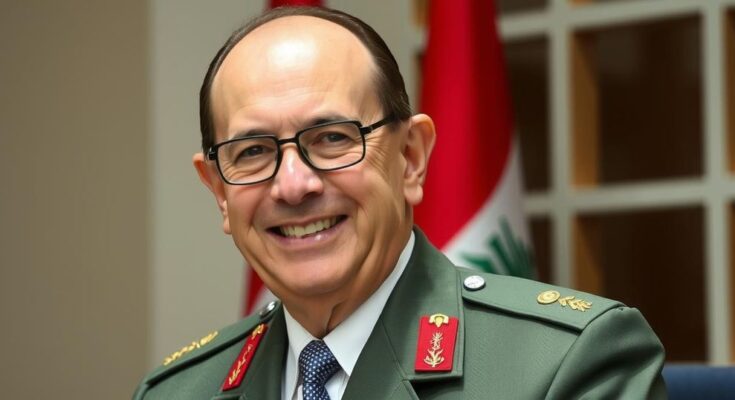Lebanon’s parliament has elected army chief Joseph Aoun as president, concluding a power struggle lasting over two years. His candidacy received backing from various political groups and international support. Aoun’s experience as army commander could provide stability amid Lebanon’s ongoing crises following the recent conflict with Israel and a severe economic depression. His election marks a hopeful step towards resolving Lebanon’s governance issues.
In a significant political development, Lebanon’s parliament has elected Joseph Aoun, the army chief, as the new president, effectively concluding a prolonged power vacuum of over two years. Supported by various political parties and international allies, including the United States, France, and Saudi Arabia, Aoun’s election indicates a shift in Lebanon’s political landscape. The previous presidential candidate, backed by Hezbollah, withdrew and endorsed Aoun prior to the vote.
The presidency in Lebanon is largely ceremonial, traditionally assigned to a Christian leader within a sectarian framework. Aoun’s election comes shortly after a ceasefire was agreed to end a devastating conflict between Israel and Hezbollah, marking a critical moment for Lebanon, as the army’s role under the ceasefire involves deploying in Southern Lebanon while ensuring Hezbollah ceases its armed activities by January 26, 2024.
Joseph Aoun, aged 60, has been at the helm of the Lebanese army since 2017 and has steered the institution through numerous crises, including the Hezbollah-Israel conflict, a severe economic downturn, and the catastrophic Beirut port explosion in 2020. The void in governance has persisted since the last parliamentary elections in May 2022, with previous attempts to elect a president thwarted multiple times due to political divisions in parliament. Following several rounds of voting that failed to secure a president, Aoun ultimately received the necessary votes in the second round, where he amassed 99 votes, surpassing the two-thirds majority required.
After his election, scenes of celebration erupted across Lebanon, signifying hope for stabilization in a nation that has faced multiple crises.
The election of Joseph Aoun reflects the complexities of Lebanon’s political landscape, characterized by a sectarian power-sharing system where the presidency is reserved for a Christian leader. The absence of a functioning government since late 2022 has placed tremendous pressure on the political system. The Lebanese army has played a crucial stabilizing role amidst ongoing crises, including economic hardship and tensions with Hezbollah. Aoun’s career as a soldier and commander positions him uniquely to address the many challenges the country faces, particularly in the context of the ceasefire agreement with Israel that necessitates military oversight in southern Lebanon.
The election of Joseph Aoun as Lebanon’s president heralds a potential turning point for the nation, seeking to overcome a prolonged power vacuum and address critical challenges ahead. His vast military experience and the strong support from various political factions and international allies may provide a framework for restoring stability in a country grappling with economic distress and political fragmentation. Aoun’s leadership will be pivotal in executing the ceasefire terms with Hezbollah and enhancing the functioning of governmental institutions moving forward.
Original Source: www.bbc.com




